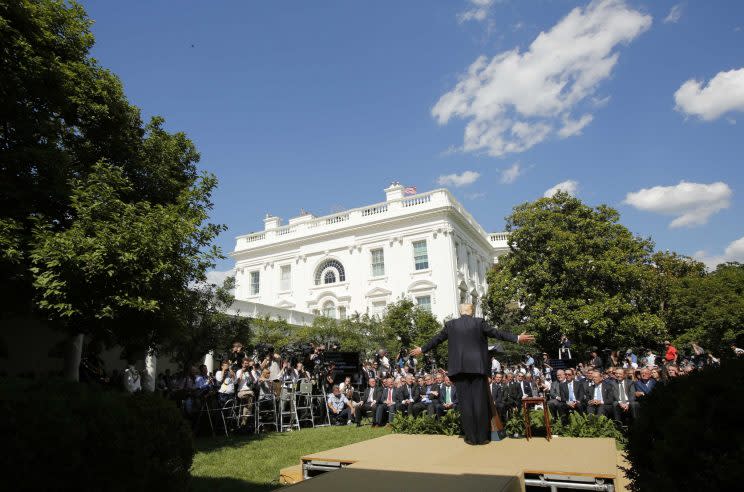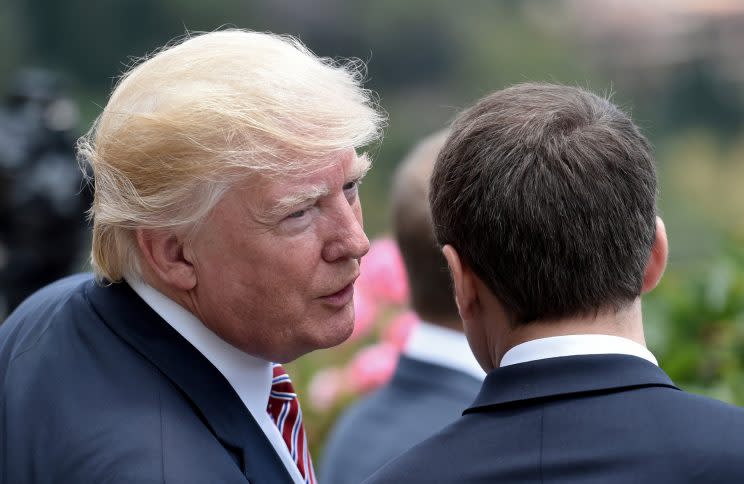Trump’s Paris trip is poised to give a clear win to France’s Macron

WASHINGTON — French President Emmanuel Macron has kept President Trump off balance over the course of their short relationship, using Trump’s own favorite tactic of unpredictability against him.
It was less than two months ago that — in the first meeting between the two men — Macron held on to Trump’s hand as the American president tried to pull away. Later that same day, Macron swerved away from Trump to shake hands with German Chancellor Angela Merkel and other world leaders while Trump stood and waited to greet the French leader.
Macron later publicly explained that he had intended to send a signal to Trump, and the world, with the photo op. Trump usually likes to play the aggressor when it comes to the handshake game.
“I don’t let anything slide. That’s how one makes oneself respected,” said Macron, who won his election while promising to strengthen the European Union, a body that nationalist Trump advisers like Steve Bannon despise. During the race, Trump had signaled support for Macron’s opponent in the French election, far-right nationalist Marine Le Pen.
In early June, Macron responded to Trump decision to ditch the Paris Agreement on climate change, tweaking the U.S. president’s signature slogan. “Make our planet great again,” Macron said. And last week the Frenchman forcefully rebutted “narrow-minded nationalism,” an apparent jab at Trump.
But in late June, Macron invited Trump to come to Paris for Bastille Day (July 14), and Trump accepted. And then at the G-20, despite his strong words for Trump, Macron sidled up to the American during the group photo.
Trump will arrive in France on Thursday morning for a two-day visit that will serve as the next chapter in the complex and curious relationship between the two world leaders.

Trump’s fascination with Macron may stem in part from his willingness to buck French political norms. He created a brand new political party, En Marche! (roughly translated as Let’s go! or On The Move!) to be his vehicle to the presidency. He has also talked about running a “Jupiterian” presidency — as in the king of the Roman gods.
The French leader’s intentional displays of strength, including Macron’s decision to parade down the Champs-Élysées during his inaugural parade in a military rather than civilian vehicle, have attracted Trump’s admiration, sources said.
Trump himself reportedly wanted to include military vehicles in his own inaugural parade, and the Bastille Day parade will feature plenty of martial pageantry, including the presence of American troops, to mark the 100-year anniversary of the United States entering World War I.
One French official suggested that Trump’s failure to convince U.S. military officials to allow him to include military vehicles in his own inauguration this past January partly explained Trump’s eagerness to come to France. “Apparently Trump loves that, and he did not understand why his presidential inauguration ceremony didn’t have one,” the unnamed official told Le Journal du Dimanche.
Trump is also badly in need of distraction from troubles back home, as controversy over Trump campaign links to Russian meddling in the U.S. election has reached new heights following new disclosures of his son Donald Trump Jr.’s eagerness to receive information about Democratic nominee Hillary Clinton from the Russian government during the campaign.
But the admiration for Macron inside the White House goes beyond symbolism. Bannon told Yahoo News that while Macron ran as a “globalist,” he has made a number of nationalist gestures, all in the name of positioning France as the preeminent nation in Europe.
“Populist nationalist is the right side of history,” Bannon said in a phone interview, and asserted that the only question is whether the leftist version of nationalism championed by Jeremy Corbyn in Britain and Sen. Bernie Sanders in the U.S. wins the day — or something closer to Trump and Bannon’s version.
Bannon said Macron, a centrist, is closer to Trump’s philosophy than he is to the progressive version because he does not want the state to run the economy.

But French experts said the parallels between Trump and Macron are not so clear. “This has nothing to do with the savage libertarianism that has been festering among Republicans for the last several years,” said Robert Zaretsky, professor of French history at the University of Houston. “They are not kindred spirits.”
Macron has tapped into a strain of French nationalism that has characterized his country’s politics since World War II, sometimes colored by mistrust of U.S. commitments. Whereas Le Pen channeled that sentiment through anti-immigration policies, Macron has gone a more internationalist route. Macron tried — and failed — to convince Trump to remain in the Paris Agreement, and has not given up winning over his American counterpart to the cause of battling climate change.
But French presidents don’t fit neatly into the dismissive “globalist” tag White House nationalists like to attach to critics of their approach to the world. France tested a nuclear weapon in 1960 and built its own arsenal in part to be able to deter Soviet aggression in the event the United States did not uphold its mutual-defense obligations under NATO. In 1966, then President Charles de Gaulle withdrew France from NATO’s military command, citing a need to keep a free hand in asserting his country’s national interests. In 2009, with the threat from Moscow much abated, then President Nicolas Sarkozy returned France to the alliance as a full member. France keeps close ties with its former colonies and encourages the spread — or at least the maintenance — of the use of the French language in order to maintain its influence.
Since 9/11, French-U.S. intelligence cooperation has remained strong. And Paris has not hesitated to use force against suspected extremists in Africa.
“France is far and away one of the largest and strongest military members of the [NATO] alliance and spends an awful lot of defense right now, and carries a heavy load in the counterterrorism fight, in particular in places so that really we don’t have to,” a senior Trump aide told reporters on Tuesday. “So when you consider that the Sahel, for example, is half the size of the United States, and the French are carrying on the counterterrorism effort there with 4,000 or 5,000 French soldiers, I mean, their contributions are great.”
France committed forces to the war in Afghanistan in 2001, but by late 2002 and early 2003 it was one of the most outspoken opponents of the invasion of Iraq, which soured relations with Washington. By 2005, however, then President Jacques Chirac eagerly worked with George W. Bush in a successful push to reduce Syrian influence in Lebanon. In 2013, when then President Barack Obama seemed to be gearing up for military action in Syria, a country once under French administration, Paris was Washington’s closest partner.

Macron’s seizing of the initiative in his relationship with Trump is indicative of the way he has approached his first weeks in power, filling a power vacuum in Europe and on the world stage. He did not race to the U.S. for a meeting with Trump, as British Prime Minister Theresa May did. Instead, he challenged Trump, as he did Russian President Vladimir Putin.
This has put him in a position to woo Trump. Macron has so far used both Trump and Putin as springboards, growing in international stature every time he speaks bluntly against them. In Putin’s case, Macron dismissed Kremlin-sponsored news outlets as propaganda — while standing next to the Russian leader.
In part because of this dynamic, Zaretsky said that unlike in Britain, where May’s invitation to Trump for a visit drew loud objections, “nobody [in France] is speaking out against the invitation.”
“It’s fascinating. I think everybody is actually keen on Trump stepping into a trap. The trap is really symbolic,” Zaretsky said. The image-heavy portions of Trump’s visit — dinner at the Eiffel Tower, a visit to Napoleon’s tomb — “will be Republican, not monarchical,” he said.
“It’s really a win-win situation [for Macron],” Zaretsky said. “If he succeeds in persuading Trump to rethink the Paris climate agreement [or] to agree to a more explicit policy on the West’s attitude toward the tragedy in Syria, or to a common policy on antiterrorism, he’s going to be the clear winner in all of this. … And if he doesn’t succeed, nevertheless he will have brought Trump to France at the most symbolically important moment of the year for France, namely the three revolutionary values that Trump flouts day in and day out: liberty, equality and fraternity.”
Read more from Yahoo News:
Russia probe is not a ‘witch hunt,’ FBI nominee Wray tells senators
Senate health care plan B, or maybe C or D, takes shape, as conservative bloc hardens stand
Iceberg nearly twice the size of Rhode Island breaks off Antarctica
Scarborough leaves GOP: ‘You apologize for your party for so long…’
Photos: In Mosul, the war is never over, even when the shooting stops

